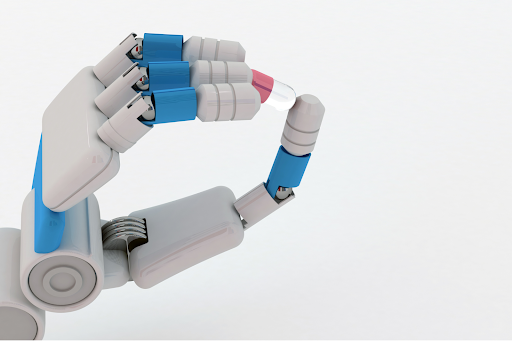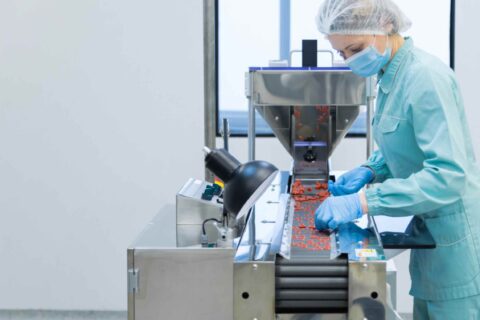The pharmaceutical industry stands on the verge of a transformative era driven by advancements in Artificial Intelligence (AI).
This technology is changing how drugs are discovered, manufactured, and delivered to patients. From accelerating drug discovery through generative AI to optimizing manufacturing workflows, AI is rapidly becoming a cornerstone in the pursuit of greater efficiency and effectiveness in pharmaceutical operations.
The Role of AI in Enhancing Pharmaceutical Manufacturing
Generative AI in Drug Discovery
One of the most groundbreaking applications of AI in pharmaceuticals is in the field of drug discovery.
Generative AI, which involves algorithms that can design new molecules that are predicted to be useful therapeutically, is reshaping the timelines and success rates of drug development. According to the McKinsey Global Institute, generative AI could potentially generate between $60 billion and $110 billion annually in economic value for the pharma and medical product industries.
By dramatically speeding up the drug discovery process and improving the precision of targeting diseases, AI is not only cutting costs but also bringing lifesaving drugs to market faster than ever before.
Enhancing Manufacturing Processes with AI
Beyond discovery, AI’s impact extends deeply into the manufacturing processes. Here, AI technologies are employed to enhance efficiency and ensure stringent quality control—critical aspects in the manufacture of pharmaceuticals.
AI-driven systems are capable of analyzing vast amounts of production data in real time, identifying patterns that human operators might miss. This capability not only speeds up the manufacturing process but also reduces waste and enhances product quality.
For instance, AI can predict when a machine is likely to fail or when a process is deviating from its standard parameters, allowing for preemptive maintenance and adjustments before costly downtime occurs. This ensures continuous production and adheres to the rigorous standards imposed by regulatory bodies.
Mareana’s AI Solution: How Mareana CPV Is Transforming Workflows
Mareana’s Mareana CPV offers a comprehensive and integrated approach to enhancing operational efficiency. This state-of-the-art digital SaaS solution is designed specifically to address the critical demands of the pharmaceutical industry, focusing on real-time monitoring, compliance, and optimization of manufacturing processes.
Below are the key features of Mareana CPV:
- Real-Time Insights and Process Optimization: Mareana CPV delivers actionable insights in real-time, enabling manufacturers to enhance operational efficiency significantly. By contextualizing data and integrating a Data Science Studio with multivariate analysis capabilities, it eliminates the need for multiple systems and streamlines the decision-making process.
- Integrated Enterprise Solution and Digital Twin Native: This platform is not just compatible but native to digital twin technologies. It ensures that pharmaceutical companies can simulate and optimize their manufacturing processes in a virtual environment before actual production, thereby improving yield and capital efficiency.
- Streamlined Compliance and Automated Data Processing: Mareana CPV simplifies regulatory compliance through automated documentation, audit trails, and real-time reporting, aligning with strict industry standards and regulations. The automated processing of data ensures that compliance is maintained without manual overhead, reducing the potential for errors and non-compliance.
- AI-Driven Excellence: Utilizing advanced AI algorithms, Mareana CPV proactively manages deviations and anomalies in manufacturing processes. It automatically triggers alerts and provides diagnostic support to address issues swiftly, ensuring consistent product quality and reducing waste.
Mareana CPV Enhances Workforce Productivity
Aside from automating routine tasks, Mareana CPV also empowers the workforce to focus on higher-value activities. By automating the compilation and analysis of quality control data and integrating seamlessly with existing manufacturing systems, employees are freed from repetitive tasks. This shift allows them to engage in strategic initiatives such as process optimization and innovation, enhancing job satisfaction and productivity.
Mareana CPV is a transformative solution designed to meet the evolving needs of the pharmaceutical manufacturing sector. It offers a unique combination of efficiency, compliance, and innovation, making it an indispensable tool for companies aiming to leverage the full potential of AI in pharmaceutical manufacturing.
Monitoring Regulatory Changes and Ensuring Data Transparency
The regulatory landscape for pharmaceutical manufacturing continues to emphasize the critical importance of data transparency and stringent quality assurance. Regulatory bodies worldwide are increasingly mandating comprehensive data tracking and reporting to ensure that all aspects of drug manufacturing meet safety and efficacy standards.
AI technologies play a focal role in helping pharmaceutical companies comply with these regulations. For instance, AI can track batch records, monitor quality control processes, and ensure compliance with environmental regulations. AI’s advanced analytics capabilities also enable manufacturers to detect and address potential quality issues before they lead to non-compliance.
Challenges and Strategic Considerations of AI Integration
While the integration of AI into pharmaceutical manufacturing promises substantial benefits, it also presents several challenges that must be carefully managed:
- Ensuring Patient Confidentiality: Pharmaceutical companies must implement robust security measures to protect patient information and comply with data protection regulations such as GDPR and HIPAA.
- Standardizing AI Tools: The pharmaceutical sector faces challenges in standardizing AI tools across different facets of drug development and manufacturing. This standardization is crucial for ensuring that AI systems are reliable, reproducible, and capable of interfacing seamlessly with existing technologies.
Executives must adopt strategic approaches to navigate these challenges effectively:
- Robust Data Governance Frameworks: Implementing comprehensive data governance strategies will help ensure that AI systems are used responsibly and that data privacy is maintained.
- Continuous Training and Development: Investing in ongoing training for AI systems and personnel can help maintain the accuracy and effectiveness of AI applications, ensuring they adapt to evolving regulatory and technological landscapes.
- Collaboration with Regulatory Bodies: Proactively engaging with regulators can help ensure that AI solutions comply with current regulations and adapt to new ones. This collaboration can also aid in shaping future regulatory frameworks that acknowledge the unique capabilities and needs of AI technologies.
The Future Outlook: AI’s Expanding Role in the Pharmaceutical Industry
The trajectory of AI within the pharmaceutical industry points toward even broader and more transformative roles soon. As AI technologies continue to evolve, their integration into pharmaceutical practices is expected to deepen, bringing about more profound changes in how drugs are discovered, developed, and delivered.
Future developments may include more advanced forms of machine learning capable of uncovering new drug formulations through complex biomolecular data analysis or even AI systems that fully automate the end-to-end manufacturing process, ensuring flawless production cycles.
As the industry continues to evolve, the integration of AI technologies like what Mareana offers will be crucial for companies aiming to stay at the forefront of pharmaceutical manufacturing. The potential for AI to improve quality, reduce costs, and accelerate development is immense, but realizing this potential requires a commitment to integration and ongoing adaptation to technological advancements.
To learn more about how Mareana’s CPV can optimize your operations, enhance productivity, and ensure compliance, request a demo or contact us directly for more information.




 Learn more
Learn more


